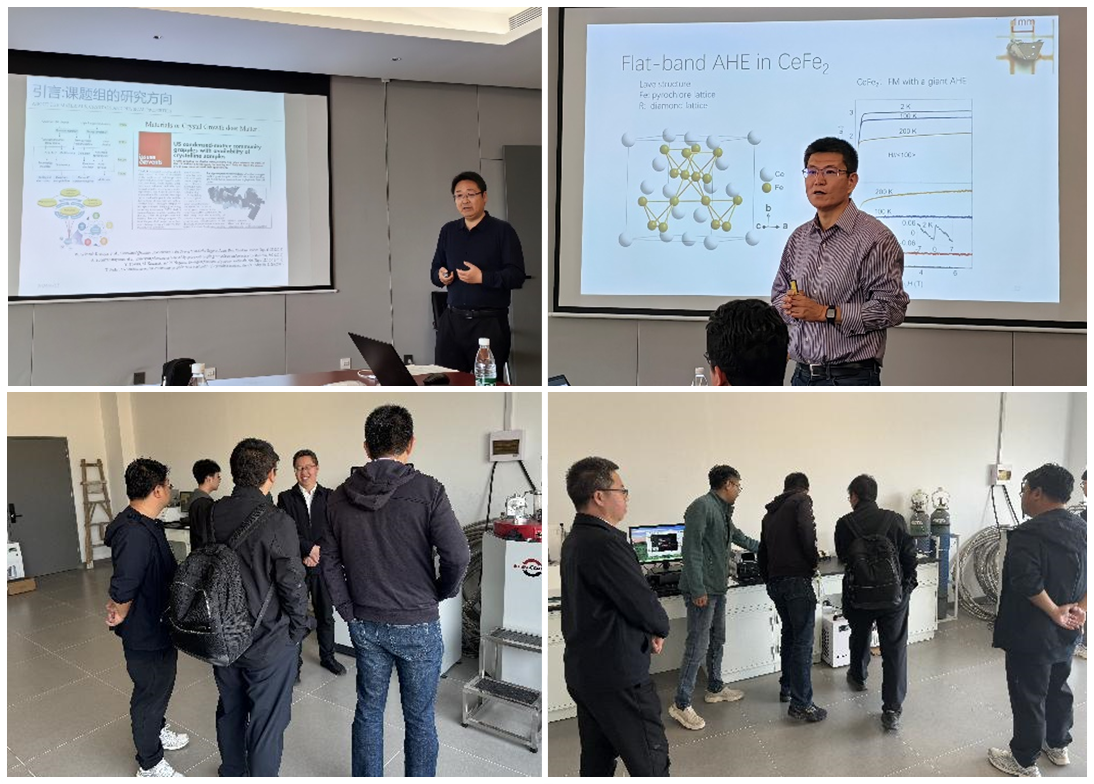In order to promote academic exchanges and cooperation, stimulate students' enthusiasm for scientific research, and create a good academic atmosphere, the College of Mathematics and Physics held a lecture on the Frontiers of condensed matter Physics in the WenLi Building 318 on April 12. At the invitation of Professor Wu Yang, Professor Xia Tianlong, Deputy head of the Department of Physics of Renmin University of China, and Professor Jia Shuang, winner of the National Outstanding Youth Fund of the School of Physics of Peking University, visited the School of Mathematics and Physics and gave a special academic report. Wang Lijun, Secretary of the Party Committee of the College of Mathematics and Physics, Lin Chengyou, vice president of the college, as well as young teachers and graduate students attended the report.

First of all, Professor Xia Tianlong gave an academic report entitled "Crystal Growth and Transport Properties in Topological Materials". He introduced and shared in detail the progress made by his research group in the exploration of topological new materials, the growth of single crystals and the study of topological physical properties in recent years.He focused on the rich magnetic properties and transport phenomena in the non-coplanar antiferromagnetic materials VNb3S6 and CoTa3S6, as well as the possible explanations behind the anomalous Hall effect and topological Hall effect found in them. Subsequently, Professor Jia Shuang gave an academic report entitled "Giant Anomalous Hall and Nernst Effects in Ce-based Intermetallic Compounds". He explained the condensed matter physics phenomena such as anomalous Hall effect and anomalous Nernst effect in a simple way, shared the anomalous Hall effect found in many materials based on the rare earth element Ce, and conducted a detailed analysis of novel physical phenomena such as abnormal Hall coefficient in these material systems. The two professors also had in-depth exchanges with the participating teachers and students. The atmosphere was lively and warm, and the students benefited a lot.
After the lecture, the two professors visited the analytical testing laboratory of the college, and exchanged and discussed the performance and operation of the experimental instruments.
This academic frontier lecture has played a positive role in promoting the active academic atmosphere of the college and tracking the new trends of discipline development. It also further improves the students' innovation ability and the level of scientific research work of the college.
【Speaker Profile】
Xia Tianlong received his Bachelor's degree in Materials Science from the University of Science and Technology of China in 2000 and his doctorate degree from the University of Hong Kong in 2006. He is currently the Wu Yuzhang Distinguished Professor, doctoral supervisor and Deputy Head of the Department of Physics at Renmin University of China. He recently expanded the laboratory for Quantum Materials and Raman spectroscopy. His research direction is quantum materials, mainly in iron-based superconductivity, topological quantum materials and other systems to carry out a series of material growth and physical properties research work. So far, he has published more than 90 papers in Nat.Comm., Phys.Rev.Lett., Phys.Rev.X, Phys.Rev.B and other journals.
Shuang Jia received his bachelor's degree in physics from Peking University in 2000 and his Ph. D. degree in physics from Iowa State University in 2008. He was a postdoctoral researcher at Princeton University from 2008 to 2012 and is currently a professor at Peking University. His main interest is the exploration synthesis and characterization of various new topological electronic materials. So far, he has published more than 100 papers in various international academic journals, with a total of more than 10,000 citations, and was selected as a global "Highly cited scientist" list by Clarivate Analytics from 2020 to 2022. In 2022, he was funded by the "Jieqing" Project of the National Natural Science Foundation of China.
